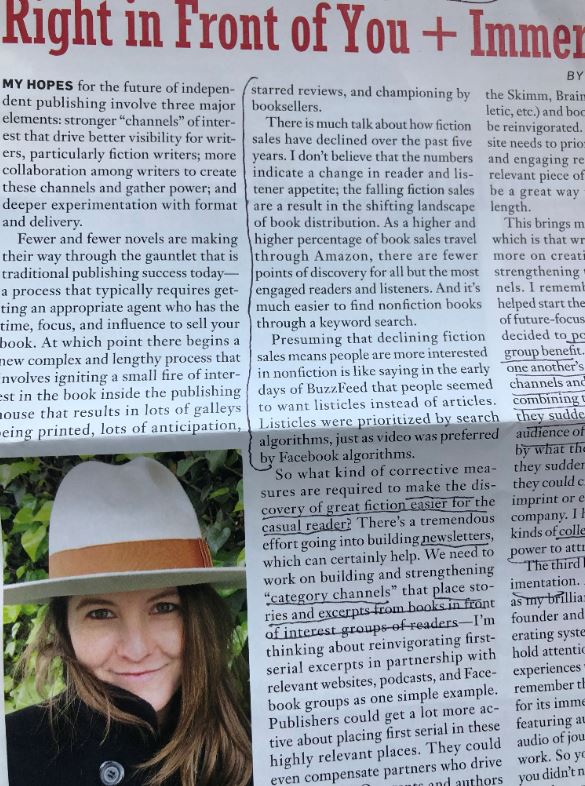I was just reading my beloved Poets & Writers magazine, which includes a great section on the future of independent publishing. I’ve been with a “Big 5” publisher (St. Martin’s) and an indie publisher (Turner), so I’ve had a range of experience.

What I’ve noticed is that, no matter the publisher, fiction books seem to be having a hard time. There are a ton of books published every year, but it seems like the majority of them get lost in the shuffle. I’ve wondered why this is happening and then I read an article by Molly Barton, cofounder and CEO of Serial Box. She pretty much hits the nail on the head:
“There is much talk about how fiction sales have declined over the past five years. I don’t believe that the numbers indicate a change in reader and listener appetite; the falling fiction sales are a result in the shifting landscape of book distribution. As a higher and higher percentage of book sales travel through Amazon, there are fewer points of discovery for all but the most engaged readers and listeners. And it’s much easier to find nonfiction books through a keyword search.”
This is SO TRUE. Back in the day, when bookstores were flourishing (or at least doing much better than they are now), people discovered fiction while perusing the shelves. Customers had relationships with people at their local bookstores. They got into conversations about what books they liked and received recommendations in return. Nowadays, with so many people buying books online, it’s hard to discover what’s even out there. Like Founder says, only the most engaged readers/listeners are aware of the new releases. I’m one of those engaged readers/listeners, and I find I have to make a substantial effort to stay in the loop. I sift through a ton of subscription e-newsletters discussing the latest releases to find something I might like. I talk to fellow reader-friends about what they’re reading; I actively seek out recommendations. I probably spend at least a few hours a week on this. Obviously, not everyone is able or willing to do that.
The solution is finding ways to connect fiction with the more casual readers who want books they’ll like served up to them. The key words there: THEY’LL LIKE. Nothing is more frustrating than starting a book and realizing it’s not your cup of tea. It feels like a waste of time, effort, energy, and MONEY. My daydream: a matchmaker book app, something where authentic recommendation-giving can happen. I’ve learned not to trust the “if you liked X, you’ll love Y” advertising I see on Amazon and the like. Often, those mentions are paid-for.
Barton also mentions that publishers need to be open to experimenting with format. People are pulled into more directions than ever these days. Attention spans are shorter. I love to read in the traditional way (with a 300-page hardcover or paperback in my lap), but I’ve also come to love audio books because they fit my life well (when I’m in the car or on a run, I listen to books). The truth: Fiction needs to come to people so people keep coming to fiction.
What are your thoughts on the future of fiction? How has the way you find books changed? How have your reading habits changed?
To be honest I do 90% or more of my reading in the car. It means I don’t read as much but that’s better than nothing. I used to be able to sit down and read for hours. But that seems next to impossible with an active family. So the few times I get to read a physical book are the minutes right before I go to sleep. So I’m currently reading/listening to two books most times…the one through audible that I can finish in a week or two…and the one on my nightstand which will likely take two months. But hey, it’s what works now I’m grateful for it!
I’m the same as you–I have been doing more and more listening. I read before bed, but I’m lucky to get 20 minutes before I fall asleep 😉
Impressive posts! My blog UY5 about Airport Transfer also has a lot of exclusive content I created myself, I am sure you won’t leave empty-handed if you drop by my page.